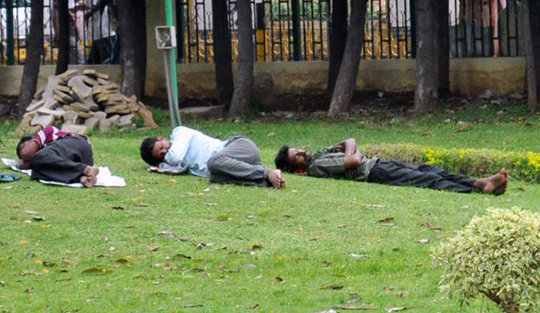Boston, Feb 4: Practising yoga may increase levels of a messenger molecule involved in regulating brain activity, and completing one yoga class per week may maintain elevated levels of this chemical, according to a study which may lead to better ways of mitigating depressive symptoms.
The study, published in the Journal of Alternative and Complementary Medicine, assessed a group of 30 clinically depressed patients who were randomly divided into two groups.
According to the researchers, including those from Boston University in the US, both groups engaged in coherent breathing, and Iyengar yoga -- a form of hatha yoga, developed by B. K. S. Iyengar, emphasising on detail, precision, and alignment in the performance of yoga postures.
The only difference between the groups, the scientists said, was the number of 90 minute yoga sessions, and home sessions in which each group participated.
Over three months, they said, the high-dose group (HDG) was assigned three sessions per week, while the low-intensity group (LIG) engaged in two sessions per week.
The participants underwent magnetic resonance imaging (MRI) scans of their brain before the first and after the last yoga session, and also completed a clinical depression scale to monitor their symptoms, the study noted.
Results of the study revealed that both groups had improvement in depressive symptoms after three months.
Their MRI analysis showed that levels of the brain messenger molecule GABA were elevated after three months of yoga, as compared to the levels before starting yoga.
According to the study, this increase was found for approximately four days after the last yoga session, but the rise was no longer observed after about eight days.
"The study suggests that the associated increase in GABA levels after a yoga session are 'time-limited' similar to that of pharmacologic treatments such that completing one session of yoga per week may maintain elevated levels of GABA," explained study co-author Chris Streeter from Boston University.
Providing evidence-based data may help in getting more individuals to try yoga as a strategy for improving their health and well-being, the scientists said.
"A unique strength of this study is that pairing the yoga intervention with brain imaging provides important neurobiological insight as to the 'how' yoga may help to alleviate depression and anxiety," said study co-author Marisa Silveri from Harvard University.
In this study, we found that an important neurochemical, GABA, which is related to mood, anxiety, and sleep, is significantly increased in association with a yoga intervention," Silveri said.






Comments
Add new comment